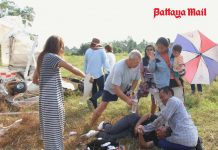Editor;
His Majesty King Bhumibol Adulyadej has long advocated the secular philosophy of Sufficiency Economy to shield the Thai people and nation from adverse internal and external threats by acknowledging the interdependence among people at all levels, cooperating rather than competing for the common good. In order to cope with economic adversity and to withstand future economic insecurity, the optimal middle path speaks to a lifestyle governed by moderation, reasonableness, tolerance, common good, moral integrity, self-awareness and spiritual enlightenment.
Foreseeing a global famine epidemic looming, with a projected 4.7 billion people added to the world’s population, the global demand for daily sustenance will more than double over the next half-century. The central issue influencing human destiny is neither the global financial crisis nor climate change, but whether humanity can accommodate and achieve an enormous sustainable harvest. Scarcities of almost everything to produce high yields of foodstuff, fresh water, farmland, mineral nutrients, fossil oil, natural gas and fish production play into and compound the other factors.
As a major exporter of rice and fruit, Thailand and ASEAN should reassess priorities and plan to increase investments in agricultural stocks, which will also help reduce urban-rural mindset inequities as well as socio-economic disparity gaps. Pragmatic idealists should envision a greener supply-and-demand sustainable global sufficiency economy where agricultural products and freshwater sources are treated with as high regard as oil and gas.
With increasingly frequent global unnatural disasters and severe weather extremes, government policies must better plan how to curtail abusive misuse and overuse of our deteriorating eco-environment, ensuring more secure and saner futures for our beloved offspring.
Dr. Charles Frederickson
Bangkok




